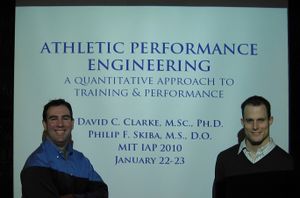User:David C. Clarke
David C. Clarke
Assistant Professor & Director of the Exercise Biology Laboratory at Simon Fraser University

Contact Information
- Department of Biomedical Physiology and Kinesiology
- Shrum Science K
- Simon Fraser University
- 8888 University Drive
- Burnaby, British Columbia V5A 1S6
- Canada
- Phone: 778-782-9777
- Office: K9632
- Laboratory: K9615
- Email me through OpenWetWare
Research interests: Exercise biology
My lab studies questions related to the biology of exercise from a quantitative perspective. Exercise training is critical to optimal health and physical performance and it motivates fundamental questions pertaining to physiological adaptability. My lab will devise and test quantitative models representing hypotheses about the physiological response to exercise and environmental stressors. We will calibrate and validate the models using experimental data that we collect from systems spanning cultured cells to human subjects. We will initially focus on the intracellular signaling network underlying skeletal muscle cell adaptations to multiple stressors as well as the dynamics of the whole-body response to training. Ultimately, we intend for our models to be used to optimize exercise prescriptions geared to achieving specific health and performance goals in individuals.
Biography
Education & training
- 2009-2013, Postdoctoral research, Massachusetts Institute of Technology, Cambridge, MA, USA (Laboratory of Douglas Lauffenburger, Department of Biological Engineering)
- 2008, Ph.D., University of Colorado at Boulder, Boulder, CO, USA (Chemical and Biological Engineering; Thesis advisor: Xuedong Liu)
- 2002, M.Sc., University of Waterloo, Waterloo, ON, Canada (Kinesiology; Thesis advisor: Arend Bonen)
- 2000, B.Sc., Laurentian University, Sudbury, ON, Canada (Kinesiology)
My scientific career was motivated by a lifelong passion for competitive sport and for understanding the training process. I therefore chose to study kinesiology for my undergraduate and Master's degrees and through it I was exposed to the physiological sciences. My knowledge and skills in investigating physiology were in turn enhanced by obtaining a Ph.D. in chemical and biological engineering because I gained expertise in applied physical chemistry, mathematical modeling and systems biology.
My postdoctoral research merged these interests as I worked on the three following projects pertaining to the quantitative analysis of hepatocyte signaling in inflammatory environments:
- Statistical methods for analyzing proteomic data
- In vitro experimental model of heat stroke
- Quantitative modeling of the hepatocyte intracellular signaling network.
In parallel, I collaborated on research and teaching of the impulse-response model of training and performance and the critical power model, both of which apply to the whole-body response to exercise. I implemented these methods in my own training and coaching in the sports of running and triathlon.
My lab therefore fosters an environment in which the principles and methods of exercise physiology, systems biology and biomedical engineering are invoked to address fundamental and applied questions regarding exercise biology.
Publications
Peer-reviewed Publications
- Clarke DC, Skiba PF. Rationale and resources for teaching mathematical modeling of athletic training and performance. Advances in Physiology Education. 2013 37(2):134-152. See commentary by Dr. Skiba here.
- Huang SC, Clarke DC, Labadorf A, Chouinard CR, Gordon W, Lauffenburger DA, Fraenkel E. Linking proteomic and transcriptional data through the interactome and epigenome reveals a map of oncogenically induced signaling. PLoS Computational Biology. 2013 Feb 9(2): e1002887. doi:10.1371/journal.pcbi.1002887.
- Clarke DC, Morris MK, Lauffenburger DA. Normalization and statistical analysis of multiplexed bead-based immunoassay data using mixed-effects modeling. Molecular and Cellular Proteomics. 2013 Jan; 12(1): 245-62.
- Clarke DC, Lauffenburger DA. Multi-pathway network analysis of human epithelial cell responses in inflammatory environments. Biochemical Society Transactions. 2012 Feb 1;40(1):133-8.
- Morris MK, Saez-Rodriguez J, Clarke DC, Sorger PK, Lauffenburger DA. Training signaling pathway maps to biochemical data with constrained fuzzy logic: quantitative analysis of liver cell responses to inflammatory stimuli. PLoS Computational Biology. 2011 Mar;7(3):e1001099.
- Clarke DC, Liu X. Measuring the absolute abundance of the Smad transcription factors using quantitative immunoblotting. Methods in Molecular Biology. 2010; 647:357-76.
- Clarke DC, Brown ML, Erickson RA, Shi Y, Liu X. Transforming growth factor-β depletion is the primary determinant of Smad signaling kinetics. Molecular and Cellular Biology. 2009 May;29(9):2443-55.
- Clarke DC, Liu X. Decoding the quantitative nature of TGF-β/Smad signaling. Trends in Cell Biology. 2008 Sep;18(9):430-42.
- Zhu S, Wang W, Clarke DC, Liu X. Activation of Mps1 promotes transforming growth factor-β-independent Smad signaling. Journal of Biological Chemistry. 2007 Jun 22;282(25):18327-38.
- Clarke DC, Betterton MD, Liu X. Systems theory of Smad signalling. Systems Biology (Stevenage). 2006 Nov;153(6):412-24.
- Clarke DC, Miskovic D, Han XX, Calles-Escandon J, Glatz JF, Luiken JJ, Heikkila JJ, Bonen A. Overexpression of membrane-associated fatty acid binding protein (FABPpm) in vivo increases fatty acid sarcolemmal transport and metabolism. Physiological Genomics. 2004 Mar 12;17(1):31-7.
- Bonen A, Benton CR, Campbell SE, Chabowski A, Clarke DC, Han XX, Glatz JF, Luiken JJ. Plasmalemmal fatty acid transport is regulated in heart and skeletal muscle by contraction, insulin and leptin, and in obesity and diabetes. Acta Physiologica Scandinavica. 2003 Aug;178(4):347-56.
Industry Publication
- Peretz, D., Khuu, C., Bautista Jr., A., Clarke, D. C., and Gao, Q. Validation and application of Bio-Plex Pro™ Cell Signaling Assays. Bio-Rad Bulletin 6331. 2013.
Lay Publication
Clarke DC, Ricci M. Calculated performance: Using quantitative models to optimize your training. Triathlete Magazine, January 2009 edition, p.119.
Media
Interviewed by Mike Thompson about performance monitoring and overtraining on his podcast, "coachmikepodcast", episode 26, available September 26, 2012. http://coachmikepodcast.podbean.com/2012/09/13/coachmikepodcast-episode-26/
Teaching interests
- Advanced exercise prescription
- Exercise physiology
- Experiments and models in physiology
Courses taught

Athletic Performance Engineering. Massachusetts Institute of Technology Independent Activities Period 2010 & 2013. Co-taught with Philip F. Skiba and the Physfarm Coaches Consortium. We presented evidence-based concepts and quantitative tools for optimizing training for athletic performance.